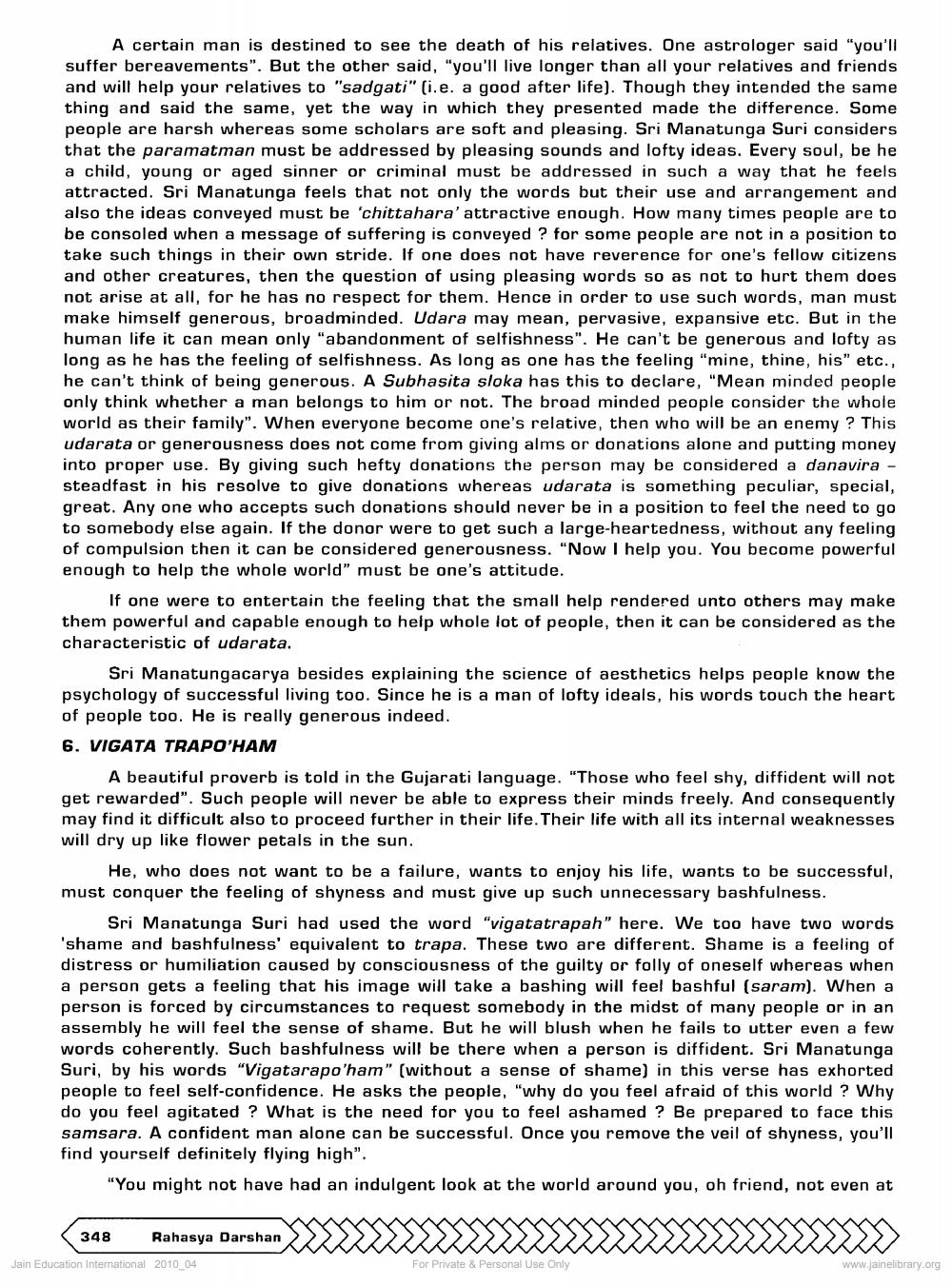________________
A certain man is destined to see the death of his relatives. One astrologer said "you'll suffer bereavements". But the other said, "you'll live longer than all your relatives and friends and will help your relatives to "sadgati" (i.e. a good after life). Though they intended the same thing and said the same, yet the way in which they presented made the difference. Some people are harsh whereas some scholars are soft and pleasing. Sri Manatunga Suri considers that the paramatman must be addressed by pleasing sounds and lofty ideas. Every soul, be he a child, young or aged sinner or criminal must be addressed in such a way that he feels attracted. Sri Manatunga feels that not only the words but their use and arrangement and also the ideas conveyed must be 'chittahara'attractive enough. How many times people are to be consoled when a message of suffering is conveyed ? for some people are not in a position to take such things in their own stride. If one does not have reverence for one's fellow citizens and other creatures, then the question of using pleasing words so as not to hurt them does not arise at all, for he has no respect for them. Hence in order to use such words, man must make himself generous, broadminded. Udara may mean, pervasive, expansive etc. But in the human life it can mean only "abandonment of selfishness". He can't be generous and lofty as long as he has the feeling of selfishness. As long as one has the feeling "mine, thine, his" etc., he can't think of being generous. A Subhasita sloka has this to declare, "Mean minded people only think whether a man belongs to him or not. The broad minded people consider the whole world as their family". When everyone become one's relative, then who will be an enemy? This udarata or generousness does not come from giving alms or donations alone and putting money into proper use. By giving such hefty donations the person may be considered a danavira - steadfast in his resolve to give donations whereas udarata is something peculiar, special, great. Any one who accepts such donations should never be in a position to feel the need to go to somebody else again. If the donor were to get such a large-heartedness, without any feeling of compulsion then it can be considered generousness. "Now I help you. You become powerful enough to help the whole world” must be one's attitude.
If one were to entertain the feeling that the small help rendered unto others may make them powerful and capable enough to help whole lot of people, then it can be considered as the characteristic of udarata.
Sri Manatungacarya besides explaining the science of aesthetics helps people know the psychology of successful living too. Since he is a man of lofty ideals, his words touch the heart of people too. He is really generous indeed. 6. VIGATA TRAPO'HAM
A beautiful proverb is told in the Gujarati language. "Those who feel shy, diffident will not get rewarded". Such people will never be able to express their minds freely. And consequently may find it difficult also to proceed further in their life. Their life with all its internal weaknesses will dry up like flower petals in the sun.
He, who does not want to be a failure, wants to enjoy his life, wants to be successful, must conquer the feeling of shyness and must give up such unnecessary bashfulness.
Sri Manatunga Suri had used the word "vigatatrapah" here. We too have two words 'shame and bashfulness' equivalent to trapa. These two are different. Shame is a feeling of distress or humiliation caused by consciousness of the guilty or folly of oneself whereas when a person gets a feeling that his image will take a bashing will feel bashful (saram). When a person is forced by circumstances to request somebody in the midst of many people or in an assembly he will feel the sense of shame. But he will blush when he fails to utter even a few words coherently. Such bashfulness will be there when a person is diffident. Sri Manatunga Suri, by his words "Vigatarapo'ham" (without a sense of shame) in this verse has exhorted people to feel self-confidence. He asks the people, "why do you feel afraid of this world ? Why do you feel agitated ? What is the need for you to feel ashamed ? Be prepared to face this samsara. A confident man alone can be successful. Once you remove the veil of shyness, you'll find yourself definitely flying high".
"You might not have had an indulgent look at the world around you, oh friend, not even at
348
Rahasya Darshan
Jain Education International 2010_04
For Private & Personal Use Only
www.jainelibrary.org




